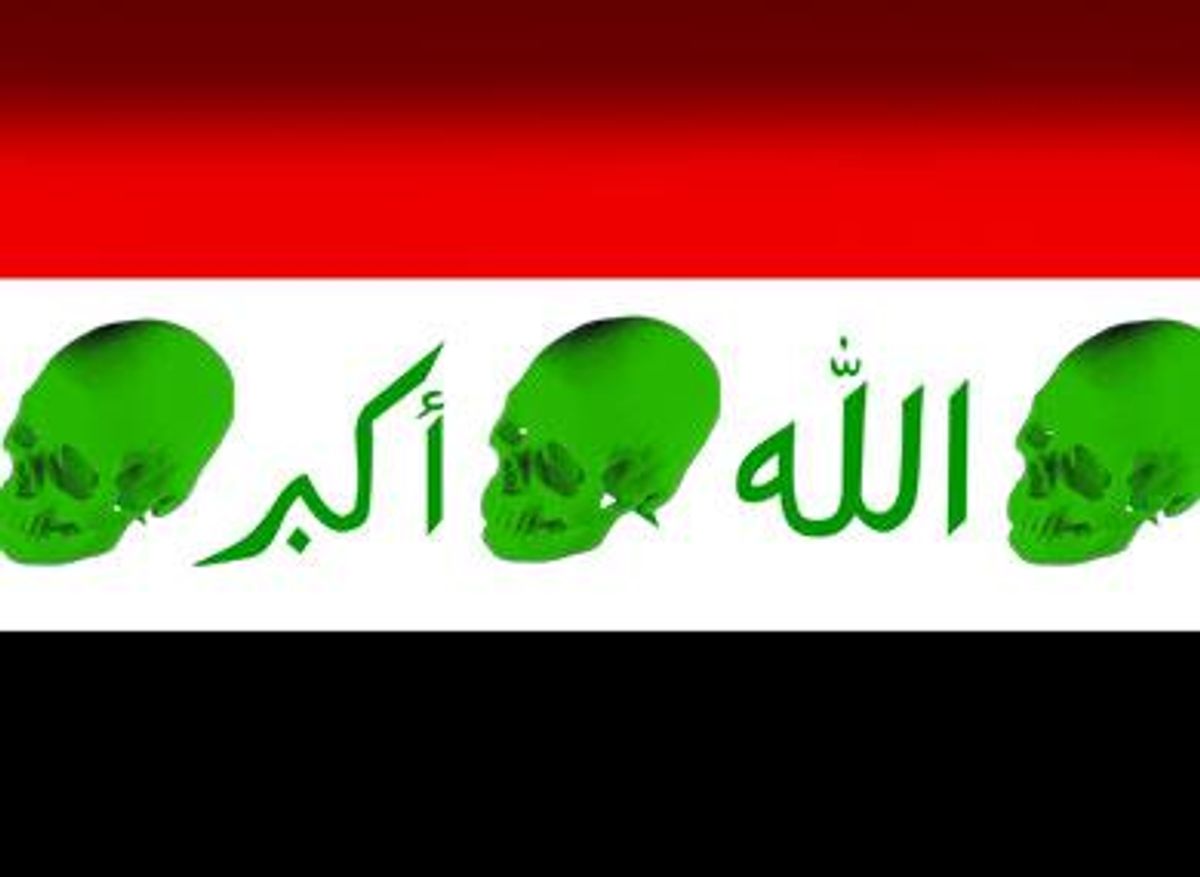COMMENTARY: "I am gay
and I am Iraqi, please help me."
A contact of mine told
me he came across this comment in an e-mail. The only
thing more extraordinary than the message was the location. He
was sitting in the U.S. embassy in Baghdad when he read it.
My contact said he was
reaching out to me because things were "heating up" for gay
men in Iraq. Over the years, he said he'd received several
e-mails from gay Iraqis that came through the U.S. embassy's
website -- they are a "single source of frustration, because
I feel completely helpless and heartbroken reading stories
about an Iraqi that is sending an e-mail probably just a few
miles from where I am sitting in the embassy, and telling me
that there is a militia coming just down the block and they
have a list."
I traveled
to Baghdad in the summer of 2007, during the height of
the U.S. surge, to get a better handle on the situation for
gays in Iraq. During my visit I met with a few gay Americans
who worked at the embassy, all of whom spoke off-the-record
when giving me quotes and providing information.
In recent months,
things have certainly been "heating up" -- articles
from
The New York Times
, the BBC, and the
Los Angeles Times
, as well as many other mainstream and gay publications, point
to the horrors of what is happening in Iraq. Each article seems
more harrowing than the last, attempting to make sense
of something that's hard to fathom for the readers who
digest these articles from the comfort and safety of an America
where "dont ask, don't tell"
and same-sex marriage make up the bulk of news
coverage.
Some outlets --
particularly in the gay press -- point to reports by
Iraqi LGBT, a London-based activist group reporting that gay
men in Iraq are on death row and that they've received a
letter from a gay Iraqi pleading for help, all of which has
been next to impossible to verify. Others point to the
reassertion of power by militias, particularly in Sadr City, a
Shia slum within Baghdad where the Mahdi Army has for years
engaged in a reign of terror against locals and the U.S.
military.
In addition to the
direct killings of gay men by the militia was the report of a
fire-bombing of a neighborhood cafe popular
among gay men. Still more articles look to the influence of
militias in combination with family honor killings -- gay men
who have been thrown out into the streets to fend for their
safety, or Iraqis who have killed gay family members.
The most disturbing
report comes from the Arab-language news source
Alarabiya
, describing the torture and killing of at least seven gay men
who have had their anuses closed using a special glue, with
Iraqi officers having forced them to take a
medicine inducing diarrhea and death. While the
English-language media has conflicting reports on what is
happening in Iraq, this report, created by those who speak the
language and have the best resources to interview local
political and religious officials, gives perhaps the best
indication of how terrible the situation has
become for LGBT Iraqis.
In the course of my work, I often come across horrific stories
like these. I am a journalist, not an activist, so the
priority is to cover them -- still, people often ask what they
can do. The answer is to put the pressure on Washington -- to
show our leaders this is a serious topic -- one that needs
their attention now.
As a child, I grew up
in a neighborhood where many of my friends were the
grandchildren of Holocaust survivors. Because of the direct
connection to this historical event, it always baffled me when
we would learn in school of American indifference to the 1930s
buildup to that era. Certainly, reading about overseas
suffering can seem an abstraction, whether 70 years ago or
today. Yet, whether today or then, how many people could have
been saved by writing letters, contacting politicians, or by
directly sending money to organizations which aid refugees?
Though what is going on
in Iraq with gay persecution is not at the same level of the
Holocaust, the major difference is that the reign of terror is
the direct result of the U.S. invasion, which completely
changed the balance of power, unleashing the situation that
exists today. In addition to the impact on the LGBT community,
the refugee situation in Iraq impacts literally millions of
people who have had to flee their homes since 2003.
My visit in
2007 lasted a month, with interviews in both the safer
Kurdish region as well as Baghdad. Even with a direct visit
trying to look at facts on the ground, it was hard to parse
what exactly was going on. Iraq is a place wracked by violence,
where even gathering information can be deadly. Killings of gay
men are often random -- seen as a side effect of
living in Baghdad. Signs someone is gay -- long hair and
stylish clothes -- are often the signs one is Westernized, an
excuse for murder by those bent on overthrowing the occupation.
It is also apparent that men who are stereotypically gay are
targets for abduction and murder, even at military checkpoints
our own government has established throughout the city.
Scott Long (pictured),
who heads the LGBT division of Human Rights Watch, is currently
in Iraq aiding gay men seeking refuge. He told me via e-mail
that "I spoke today to a gay man who escaped Baghdad after
multiple attempts by armed men to abduct him off the street. He
was almost speechless with terror."
Long added, "There's
obviously an enormous moral burden upon the U.S. for creating a
climate in which violence against all kinds of vulnerable
groups could metastasize with impunity. That doesn't
detract from the responsibility of the government of an
independent Iraq to institute rule of law and protect all its
own population."
As Americans looking
into this issue from the relative safety of our own lives, we
must ask what responsibility the United States bears
and what can be done to put pressure on the Iraqi government.
Baghdad under Saddam was a cosmopolitan city with a relative
tolerance toward gays as part of the fabric of society. Saddam
even kept a network of gay spies to sleep with gay foreign
diplomats and extract secrets, perhaps the strongest
acknowledgement of gay culture before the occupation.
But the invasion
changed all of that, wiping out the cosmopolitan society, with
gay culture, music, art, women in the workforce, and other
factors under attack as militias and religious leaders asserted
power in the chaos.
Openly gay U.S.
congressman Jared Polis, a Colorado Democrat, visited Iraq in
early April and found in his discussions by phone with gay
Iraqi men that "many fondly reminisced about life under
Saddam."
He said most gay people
are closeted, as they are in places like Jordan and Syria,
where many gay Iraqis, among other refugees, have fled to
escape violence and, in many cases, await asylum. These
countries do not have perfect LGBT rights records, Polis
commented, but "at the very least, [gay
citizens] don't live in constant fear for their
lives."
Polis's findings mirror
the comments made by the gay men I met in Iraq. It is not hard
to argue that the locus of responsibility for the deaths of gay
men in Iraq lies squarely with the U.S. decision to invade the
country. The occupation changed the political structure of the
country, creating a power vacuum that led to the rise of a
militant insurgency, using Islamic fundamentalism as a cover
for its horrific deeds.
No matter one's opinion
of the war, the question is what to do now. According to Polis,
there are "some friendly elements in the Iraqi government,"
but the "problem is the breakdown of the chain of command and
the failure of duty to protect their lesbian, gay, and
transgendered citizens." His visit was a way "to make sure
our government is aware of the issue and raise the issue with
our counterparts in Iraq."
The recent killings
reflect a dilemma in U.S. policy. The situation in Iraq is
overall significantly safer than it was during my 2007 visit.
By suppressing the militant and religious elements, the surge
created a more vibrant Baghdad, more akin to the cosmopolitan
society that once existed. Shops have reopened, artists are
displaying in galleries again, women are returning to work, and
young couples have begun to hold hands again in parks that dot
the city. But the safety induced by the surge has also allowed
for a more visible presence of Baghdad's gay community, and
with this has come the resurgence of the once-discredited
militant groups, particularly the Mahdi Army based out of Sadr
City.
According to my contact
at the embassy, "our local staff, some of whom live in Sadr
City, have told us that word on the streets is that this is the
work of JAM," referring to the Mahdi Army. He emphasized
these are "not tribal and not familial disputes." My
contact explained that since the surge, the security situation
has improved and militant groups have been suppressed, leading
to the Mahdi Army saying they are not "there protecting the
virtues of the community; this is why guys are coming out now
-- they're starting to act more Western, they're acting more
effeminate."
"The impression is
that these incidents are a way for these JAM elements to
reassert their presence in a way that is culturally
acceptable." As the surge has discredited them, "they have
to take issues overall that make them look legitimate, and the
culture being what it is in this part of the world, Iraq in
this case, in their minds, this is a legitimate cause, rooting
out homosexuality."
Under the Obama
administration, a similar surge will be conducted in
Afghanistan, diverting resources from one occupied country to
another. Ultimately, the United States will leave Iraq. While a
new government exists within the country, how long it will hold
up without the U.S. presence remains to be seen. Perhaps we can
look at gays in Iraq as canaries in a coal mine, an indication
of what is to come in a future Iraq. The absence of American
and other international forces may lead again to the deadly
chaos that existed just after the invasion.
The question now for
gay Americans is, What can we do? Myriad organizations are
focused on the issue, from Iraqi LGBT to Human Rights Watch to
the San Francisco-based Organization for Refuge, Asylum,
and Migration, whose executive director Neil Grungras
said, "Even if the West is helpless to stop the antigay
terror in Iraq, the U.S. and other enlightened nations can save
the lives of thousands of gays who will otherwise be returned
to certain death. In 2008 the U.S. accepted over 12,000 Iraqi
refugees. In 2009 it intends to take in 17,000. We are urging
the U.S. and other traditional resettlement countries to set
aside sufficient slots to save these vulnerable refugees'
lives."
My contact in Baghdad
told me that "arguments have been made for expanding the
refugee program, to allow for processing of minority groups
such as LGBT Iraqis at the American embassy in Baghdad. But
there are other minority groups -- Christians, women, Sunnis
who live in and are surrounded by Shiite communities, Shiites
surrounded by Sunnis -- that face just as great a threat and
danger."
He added, "Requests
for help that come our way do not go unnoticed or unheard. But
making public any effort to assist gay Iraqis is precarious
because we are operating in what remains -- relative to the
rest of the world -- a very conservative society. It is
suspected that the Sadr City murders carried out earlier this
month were by militias and conservative elements within Iraqi
society, which tend to be anti-American to begin with. If the
U.S. government is publicly seen by these groups as putting
pressure on the government of Iraq, that will, quite possibly,
make things worse for gay Iraqis."
It is clear though that
in another occupied country, Afghanistan, outside international
pressure can change things. Afghanistan recently approved what
has come to be called the "marriage rape law,"
interpreted to mean that men can force their wives to have sex
with them and deny them the right to leave the home without
permission. It seemed something that the Taliban would pass,
not an elected U.S.-backed government. An international uproar
ensued, along with the implicit threat that billions of dollars
in aid would be denied Afghanistan if the law were not
reexamined.
Polis suggests using
those "friendly elements in the Iraqi government" to work
on gay issues. The importance of this ultimately will be
similar to what was experienced in Afghanistan on women's
issues, and he said, "The eyes of the international human
rights community will judge Iraq by how they treat those who
face discrimination in their society."
My contact at the
embassy told me to let readers of
The Advocate
know that "if there is any piece of advice I can give our
community and those who care about the plight of gay Iraqis, it
is this: Put pressure on Washington to do more, put pressure on
your government. The only way our leaders ever know something
is serious is when we stand up and show just how serious we are
about it." He added, "If these killings in what remains a
war zone don't show the world that people do not choose at
their leisure to be persecuted, I don't know what
will."

















































































